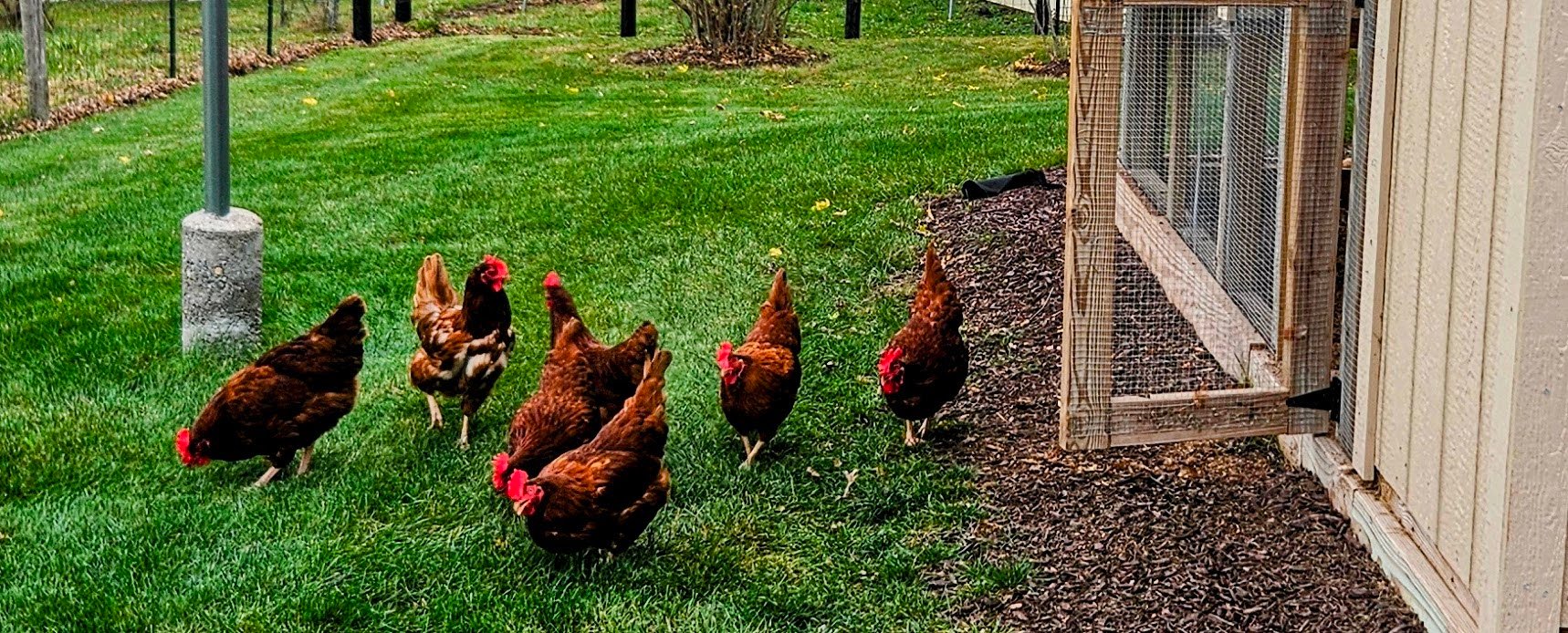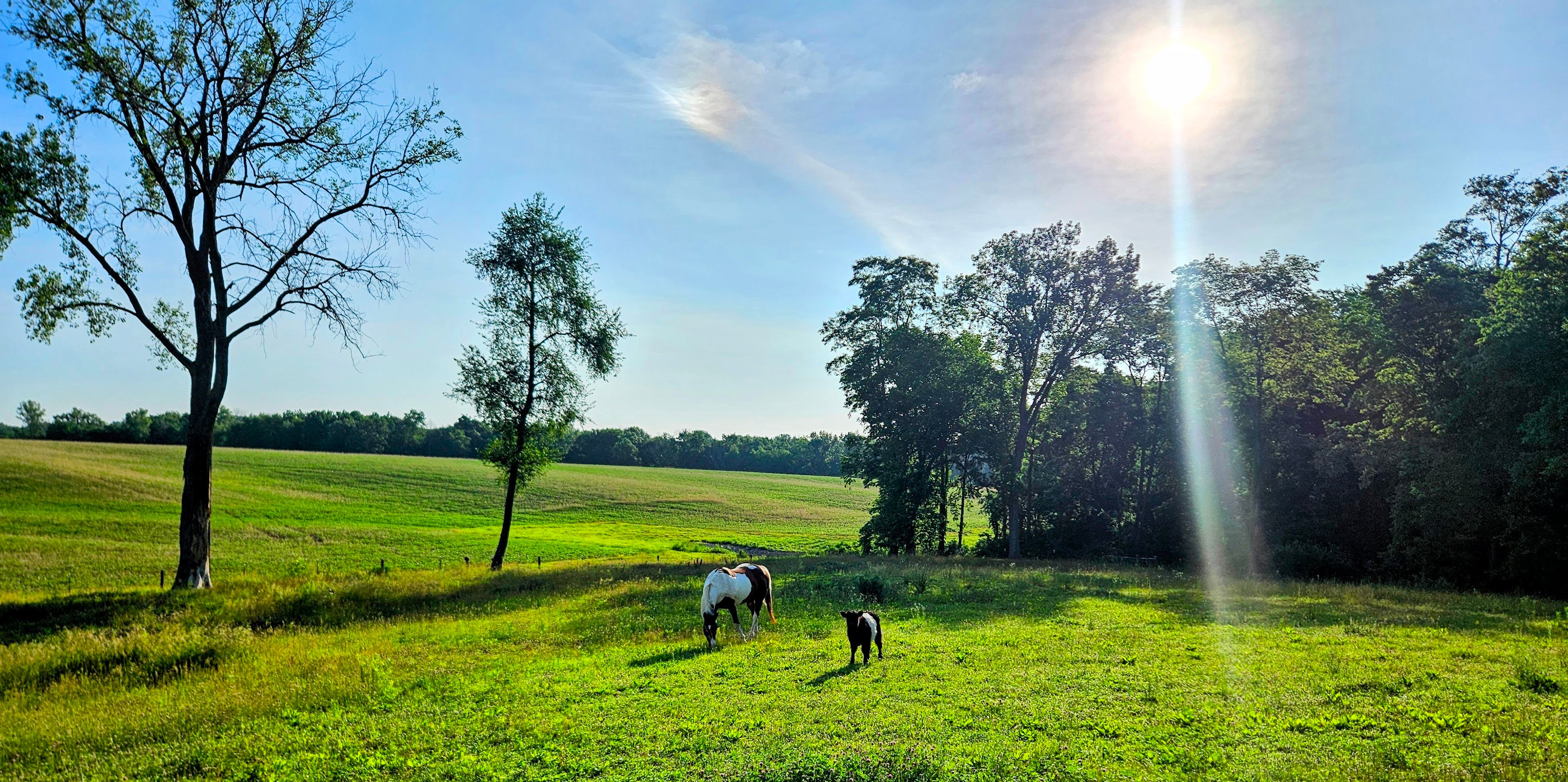
From Chicks to Chickens: Our Rhode Island Reds at Blue Grass Bend
There’s a certain charm to the cluck and chatter of chickens roaming the yard. At Blue Grass Bend, that sound has become a daily rhythm — a living heartbeat of our homestead. We welcomed our Rhode Island Red chicks in the spring of 2023, and what began as a box of peeping fluff has grown into a productive flock that gives back to us every single day.

Our Coop and Daily Routine
Overlooking the back pasture, tucked in the shade behind the house, our chicken coop was built with both protection and comfort in mind. It's a cozy structure with plenty of nesting boxes, good ventilation, and a safe outdoor run where the chickens scratch, peck, and dust-bathe to their hearts’ content. Each morning, the coop door swings open, and out march our Rhode Island Reds, ready to greet the day.

These ladies are reliable layers, giving us a steady supply of rich brown eggs. There’s something especially satisfying about collecting eggs still warm from the nest, knowing exactly where they came from and what went into producing them. Their diet of foraged bugs, garden scraps, and quality feed contributes to the deep orange yolks and flavorful richness of every egg.

Why Rhode Island Reds?
Rhode Island Reds are a classic homesteader’s chicken — and for good reason. They’re hardy, adaptable, and wonderfully friendly. These birds don’t mind a cold snap or a summer scorcher, and they tend to be calm and easy-going with both people and other animals.

Ours have distinct personalities, too. Some are bold and curious, others more reserved — but all of them have earned their place here at Blue Grass Bend. They’re surprisingly social and follow us around the yard, especially if they think treats are involved!

Fun Facts About Homestead Chickens
Homesteading with chickens is more than just collecting eggs — it’s a relationship, a routine, and a daily dose of joy. Here are a few fun facts we’ve come to appreciate along the way:
- Chickens remember faces. They can recognize and remember over 100 human and animal faces. Ours certainly know us — and the sound of the treat bucket!

- They have a natural pecking order. This social hierarchy keeps the flock organized, though sometimes we have to step in to keep peace when personalities clash.

- Dust baths are a spa day. Chickens roll in dry dirt to clean themselves and rid their feathers of pests. It’s messy but essential — and pretty funny to watch.

- They lay fewer eggs in winter. Shorter days mean fewer eggs, but with some natural light and good care, production picks up again in spring.

- Chickens are natural composters. Food scraps, garden weeds, and even leftovers become part of their diet — and in turn, their manure becomes garden gold.
The Gifts They Give
Our chickens give us more than eggs. They contribute to the ecosystem of our homestead, eating pests, creating compost for the garden, and helping us stay connected to the cycle of seasons. They’ve become part of our family rhythm, from the morning egg collection to the evening round-up.

There’s something deeply grounding about walking out to the coop, coffee in hand, and greet the flock. It slows you down. It brings you into the moment. And it reminds you of the beauty of providing for yourself in simple, meaningful ways.

Looking Ahead
As we move through another season, we’re grateful for the role these chickens play in our daily life. They’re a symbol of what we strive for at Blue Grass Bend: sustainability, simplicity, and a little joy in the ordinary.

If you’ve ever considered adding chickens to your homestead — or even a backyard flock — we can’t recommend it enough. Just be ready: it’s hard not to fall in love with the clucks, quirks, and gifts they bring.
.png?width=50&height=50&name=8%20(2).png)

